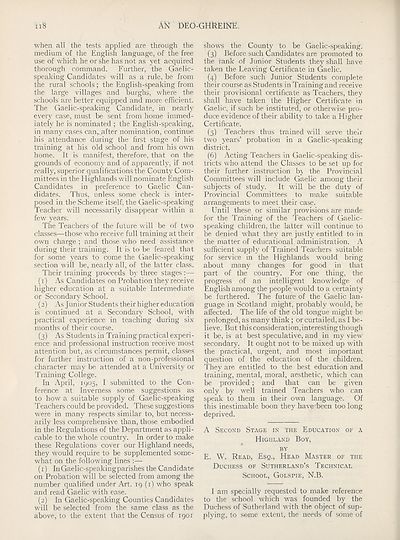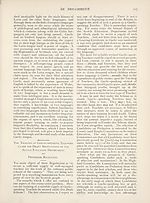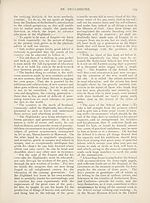An Comunn Gàidhealach Publications > Deo-gréine > Volume 1, October 1905-September 1906
(138) Page 118
Download files
Complete book:
Individual page:
Thumbnail gallery: Grid view | List view

n8
AN DEO-GHREINE.
when all the tests applied are through the
medium of the English language, of the free
use of which he or she has not as yet acquired
thorough command. Further, the Gaelic¬
speaking Candidates will as a rule, be from
the rural schools; the English-speaking from
the large villages and burghs, where the
schools are better equipped and more efficient.
The Gaelic-speaking Candidate, in nearly
every case, must be sent from home immed¬
iately he is nominated ; the English-speaking,
in many cases can, after nomination, continue
his attendance during the first stage of his
training at his old school and from his own
home. It is manifest, therefore, that on the
grounds of economy and of apparently, if not
really, superior qualifications the County Com¬
mittees in the Highlands will nominate English
Candidates in preference to Gaelic Can¬
didates. Thus, unless some check is inter¬
posed in the Scheme itself, the Gaelic-speaking
Teacher will necessarily disappear within a
few years.
The Teachers of the future will be of two
classes—those who receive full training at their
own charge ; and those who need assistance
during their training. It is to be feared that
for some years to come the Gaelic-speaking
section will be, nearly all, of the latter class.
Their training proceeds by three stages :—
(1) As Cand idates on Probation they receive
higher education at a suitable Intermediate
or Secondary School.
(2) As Junior Students their higher education
is continued at a Secondary School, with
practical experience in teaching during six
months of their course.
(3) As Students in Training practical experi¬
ence and professional instruction receive most
attention but, as circumstances permit, classes
for further instruction of a non-professional
character may be attended at a University or
Training College.
In April, 1905, I submitted to the Con¬
ference at Inverness some suggestions as
to how a suitable supply of Gaelic-speaking
Teachers could be provided. These suggestions
were in many respects similar to, but necess¬
arily less comprehensive than, those embodied
in the Regulations of the Department as appli¬
cable to the whole country. In order to make
these Regulations cover our Highland needs,
they would require to be supplemented some¬
what on the following lines :—
(1) In Gaelic-speaking parishes the Candidate
on Probation will be selected from among the
number qualified under Art. 19 (1) who speak
and read Gaelic with ease.
(2) In Gaelic-speaking Counties Candidates
will be selected from the same class as the
above, to the extent that the Census of 1901
shows the County to be Gaelic-speaking.
(3) Before such Candidates are promoted to
the rank of Junior Students they shall have
taken the Leaving Certificate in Gaelic.
(4) Before such Junior Students complete
their course as Students in Training and receive
their provisional certificate as Teachers, they
shall have taken the Higher Certificate in
Gaelic, if such be instituted, or otherwise pro¬
duce evidence of their ability to take a Higher
Certificate.
(5) Teachers thus trained will serve their
two years’ probation in a Gaelic-speaking
district.
(6) Acting Teachers in Gaelic-speaking dis¬
tricts who attend the Classes to be set up for
their further instruction bj the Provincial
Committees will include Gaelic among their
subjects of study. It will be the duty of
Provincial Committees to make suitable
arrangements to meet their case.
Until these or similar provisions are made
for the Training of the Teachers of Gaelic¬
speaking children, the latter will continue to
be denied what they are justly entitled to in
the matter of educational administration. A
sufficient supply of Trained Teachers suitable
for service in the Highlands would bring
about many changes for good in that
part of the country. For one thing, the
progress of an intelligent knowledge of
English among the people would to a certainty
be furthered. The future of the Gaelic lan¬
guage in Scotland might, probably would, be
affected. The life of the old tongue might be
prolonged, as many think ; or curtailed, as I be¬
lieve. But this consideration, interesting though
it be, is at best speculative, and in my view
secondary. It ought not to be mixed up with
the practical, urgent, and most important
question of the education of the children.
They are entitled to the best education and
training, mental, moral, aesthetic, which can
be provided; and that can be given
only by well trained Teachers who can
speak to them in their own language. Of
this inestimable boon they have been too long
deprived.
A Second Stage in the Education of a
Highland Boy,
BY
E. W. Read, Esq., Head Master of the
Duchess of Sutherland’s Technical
School, Golspie, N.B.
I am specially requested to make reference
to the school which was founded by the
Duchess of Sutherland with the object of sup¬
plying, to some extent, the needs of some of
AN DEO-GHREINE.
when all the tests applied are through the
medium of the English language, of the free
use of which he or she has not as yet acquired
thorough command. Further, the Gaelic¬
speaking Candidates will as a rule, be from
the rural schools; the English-speaking from
the large villages and burghs, where the
schools are better equipped and more efficient.
The Gaelic-speaking Candidate, in nearly
every case, must be sent from home immed¬
iately he is nominated ; the English-speaking,
in many cases can, after nomination, continue
his attendance during the first stage of his
training at his old school and from his own
home. It is manifest, therefore, that on the
grounds of economy and of apparently, if not
really, superior qualifications the County Com¬
mittees in the Highlands will nominate English
Candidates in preference to Gaelic Can¬
didates. Thus, unless some check is inter¬
posed in the Scheme itself, the Gaelic-speaking
Teacher will necessarily disappear within a
few years.
The Teachers of the future will be of two
classes—those who receive full training at their
own charge ; and those who need assistance
during their training. It is to be feared that
for some years to come the Gaelic-speaking
section will be, nearly all, of the latter class.
Their training proceeds by three stages :—
(1) As Cand idates on Probation they receive
higher education at a suitable Intermediate
or Secondary School.
(2) As Junior Students their higher education
is continued at a Secondary School, with
practical experience in teaching during six
months of their course.
(3) As Students in Training practical experi¬
ence and professional instruction receive most
attention but, as circumstances permit, classes
for further instruction of a non-professional
character may be attended at a University or
Training College.
In April, 1905, I submitted to the Con¬
ference at Inverness some suggestions as
to how a suitable supply of Gaelic-speaking
Teachers could be provided. These suggestions
were in many respects similar to, but necess¬
arily less comprehensive than, those embodied
in the Regulations of the Department as appli¬
cable to the whole country. In order to make
these Regulations cover our Highland needs,
they would require to be supplemented some¬
what on the following lines :—
(1) In Gaelic-speaking parishes the Candidate
on Probation will be selected from among the
number qualified under Art. 19 (1) who speak
and read Gaelic with ease.
(2) In Gaelic-speaking Counties Candidates
will be selected from the same class as the
above, to the extent that the Census of 1901
shows the County to be Gaelic-speaking.
(3) Before such Candidates are promoted to
the rank of Junior Students they shall have
taken the Leaving Certificate in Gaelic.
(4) Before such Junior Students complete
their course as Students in Training and receive
their provisional certificate as Teachers, they
shall have taken the Higher Certificate in
Gaelic, if such be instituted, or otherwise pro¬
duce evidence of their ability to take a Higher
Certificate.
(5) Teachers thus trained will serve their
two years’ probation in a Gaelic-speaking
district.
(6) Acting Teachers in Gaelic-speaking dis¬
tricts who attend the Classes to be set up for
their further instruction bj the Provincial
Committees will include Gaelic among their
subjects of study. It will be the duty of
Provincial Committees to make suitable
arrangements to meet their case.
Until these or similar provisions are made
for the Training of the Teachers of Gaelic¬
speaking children, the latter will continue to
be denied what they are justly entitled to in
the matter of educational administration. A
sufficient supply of Trained Teachers suitable
for service in the Highlands would bring
about many changes for good in that
part of the country. For one thing, the
progress of an intelligent knowledge of
English among the people would to a certainty
be furthered. The future of the Gaelic lan¬
guage in Scotland might, probably would, be
affected. The life of the old tongue might be
prolonged, as many think ; or curtailed, as I be¬
lieve. But this consideration, interesting though
it be, is at best speculative, and in my view
secondary. It ought not to be mixed up with
the practical, urgent, and most important
question of the education of the children.
They are entitled to the best education and
training, mental, moral, aesthetic, which can
be provided; and that can be given
only by well trained Teachers who can
speak to them in their own language. Of
this inestimable boon they have been too long
deprived.
A Second Stage in the Education of a
Highland Boy,
BY
E. W. Read, Esq., Head Master of the
Duchess of Sutherland’s Technical
School, Golspie, N.B.
I am specially requested to make reference
to the school which was founded by the
Duchess of Sutherland with the object of sup¬
plying, to some extent, the needs of some of
Set display mode to:
![]() Universal Viewer |
Universal Viewer | ![]() Mirador |
Large image | Transcription
Mirador |
Large image | Transcription
| An Comunn Gàidhealach > An Comunn Gàidhealach Publications > Deo-gréine > Volume 1, October 1905-September 1906 > (138) Page 118 |
|---|
| Permanent URL | https://digital.nls.uk/125243568 |
|---|
| Description | Leabhar 1, An deicheamh mios 1, 1905 gu Mios Meadhonach an Fhoghair 1906. |
|---|---|
| Attribution and copyright: |
|
| Description | This contains items published by An Comunn, which are not specifically Mòd-related. It includes journals, annual reports and corporate documents, policy statements, educational resources and published plays and literature. It is arranged alphabetically by title. |
|---|
| Description | A collection of over 400 items published by An Comunn Gàidhealach, the organisation which promotes Gaelic language and culture and organises the Royal National Mòd. Dating from 1891 up to the present day, the collection includes journals and newspapers, annual reports, educational materials, national Mòd programmes, published Mòd literature and music. |
|---|---|
| Additional NLS resources: |
|

